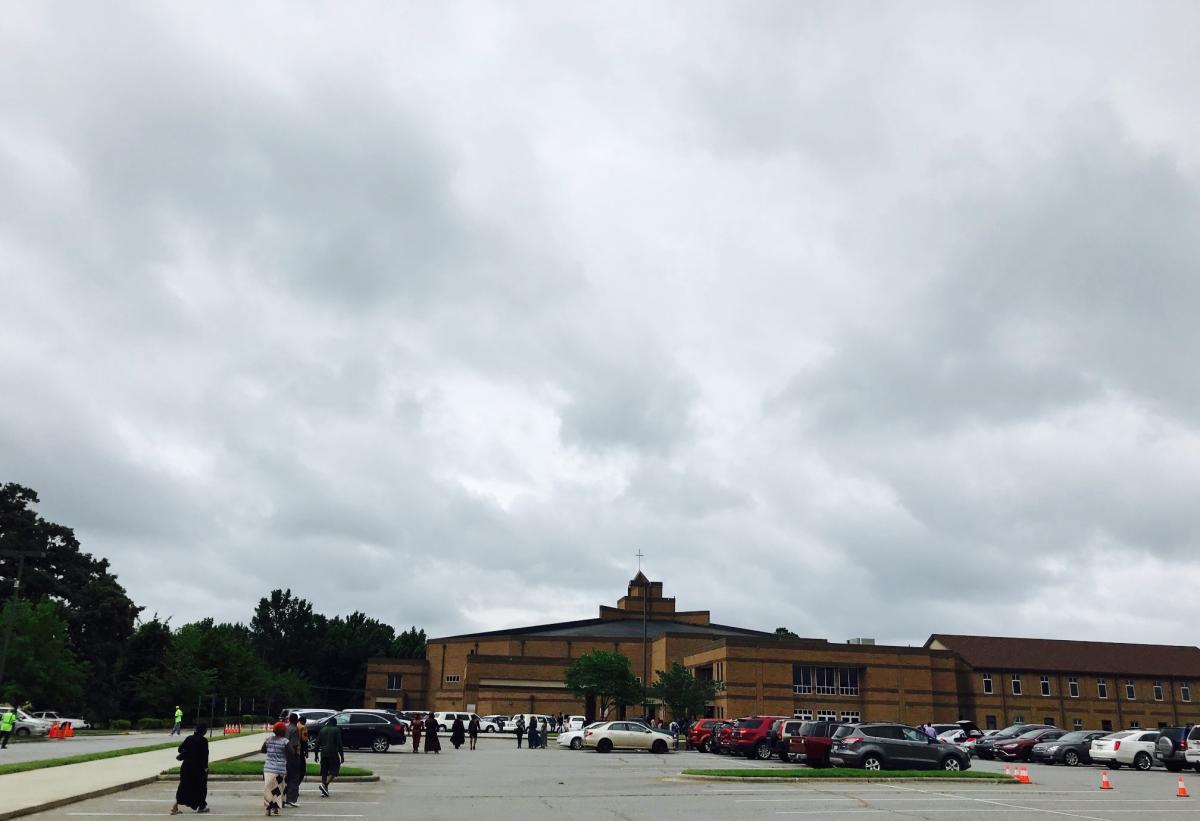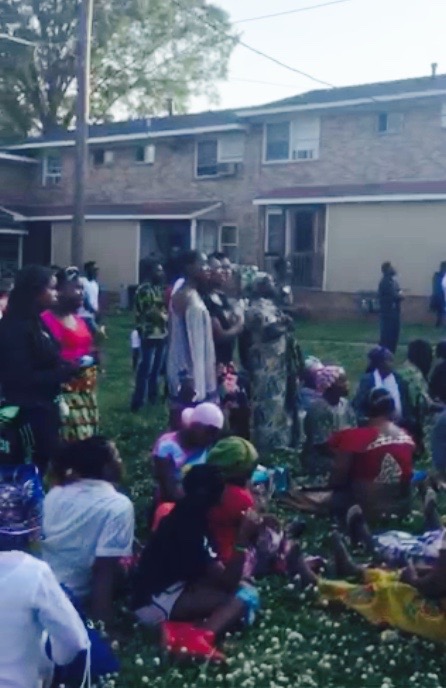On an early morning in May, a kitchen fire swept through a low-income apartment in Greensboro. Inside, a refugee family from the Democratic Republic of the Congo—five young siblings and their father—slept. The mother was working her night shift many miles away. All of the children, aged one to eight years old, perished in the blaze, leaving their parents to grieve.
But they have not grieved alone. The final installment of our series “Unsafe Haven,” surveys citizens all across the community whose lives will be forever changed.
"Homegoing Service"
At the Mount Zion Baptist Church in Greensboro, a Homegoing Service is getting underway.

Mourners walk slowly across the sprawling parking lot, a sea of colorful, traditional African dresses against the grey, overcast sky. The sound of Swahili being translated into English blares out across the asphalt from loudspeakers attached to the enormous modern church, welcoming new arrivals.
Many of them now call North Carolina home, but they come from Sudan, Uganda, the Democratic Republic of the Congo, and elsewhere on the African continent. More than 400 visitors, family members, and friends enter the church, led by the parents of the deceased children, Mugabo Emmanuel and Faraha Lucy.
They gather close together on pews facing five small caskets holding the three little boys and two little girls who perished in the fire. But this service is a celebration of their lives—their journey to heaven—and soon the auditorium is filled with song.
"It Changed Our View Of Housing"
Immigration advocates, volunteers, and nonprofits that worked directly with these refugees were appalled by what happened to the family.
“Because of our work with them, I think it impacted not only us emotionally—obviously, we were devastated—but also the way I think we will work with the families that we host on our campus, especially helping them, supporting them vet off-campus housing I think more diligently,” says Every Campus A Refuge founder Diya Abdo. “And really, it just sort of changed our view of housing in Greensboro. It didn't occur to me that it could be this bad.”
Before the still-mourning Congolese family left Summit-Cone, dozens of local African refugees gathered near their burned-out apartment for a healing ceremony. The sounds of terrified screams are replaced by singing voices ringing out across the courtyard.
Since the fire, the broader community has rallied around the family. The Greensboro Housing Coalition in partnership with the Community Foundation provided financial assistance to help the parents and their extended relatives relocate. Coalition Director Brett Byerly says it's work that needed to be done.
"Imagine the emotional aspect of seeing that every day. I have to walk past this apartment where five children that I'm related to died, and how that affects my mental health and stability," says Byerly. "So, it was important for the Housing Coalition to work to get those families into a place where they can kind of grieve and work on what they're going to do next in their life and where they want to go and where they want to be."
"A Great Outpouring Of Love"

Former Rankin Elementary School social worker Emily Wright counseled two of the children who died in the Summit-Cone fire. She grieved with the family, and they entrusted her with arranging the funeral service along with their Pastor Jean de Dieu Munyambabazi.
“I wanted him to be a guide for respecting their cultural norms and traditions regarding funerals and funeral ceremonies,” says Wright. “Many, many people came out to assist the family at that time. Greensboro had a great outpouring of love and care for this family during the time of the death of their children.”
Faith communities throughout the city upped their commitment to supporting Summit-Cone refugee families: aiding in relocation efforts from the condemned buildings, settling families into new apartments, providing essentials, and raising donations.
A Greensboro House Fire GoFundMe page set up on their behalf netted more than $55,000 dollars. And church groups, educators, and individuals volunteered daycare for young children of refugee parents who often work long shifts far from home.
"A Call To Compassion"
Greensboro church leaders like First Baptist's Alan Sherouse spoke to their congregations about the deadly fire. Sherouse focused on the poor living conditions of many of the city's refugees, and the moral obligation the community has to right this wrong. He says that's what a shared faith means and what the New Testament is all about.
“There's this building call to compassion that culminates when Jesus says, ‘When you welcome the stranger, you are welcoming me,'” says Sherouse. “And so, treat every stranger as though they were Christ himself is the call, is the theological underpinning. As a Christian and a person of faith, that needs to guide me in terms of how I view the stranger or my newest neighbors here.”
Sherouse spoke at the Homegoing Service for the Congolese children who died in the fire. The gathering was intended to be a celebration of young lives, and yet, lining the front of the stage are five small, white caskets, each adorned with bright yellow flowers; a startling reminder of the horrible loss.
“Part of my response has been to carefully consider all of the dynamics that led to this moment, because if we dismiss it only as an accident, that allows us to set it aside as though there's nothing we can do about it,” says Sherouse. “And I feel that there are a lot of factors that lead to a tragedy like this that we need to consider carefully as a community.”
Congolese refugee Louis Mashengo, a close friend of the family whose children died, says there's one question that keeps him up at night.
"What can we do to promote the refugee community?" Mashengo asks. “Among us we have lawyers. Among us we have doctors. Among us we have pastors. We have musicians. We have draftsmen. Okay. But we need to promote it to another level.”
In some parts of Africa, the traditional greeting is “How are the children?” The welcoming community of Greensboro is still working toward the hoped-for reply: “All the children are well.”
300x250 Ad
300x250 Ad

